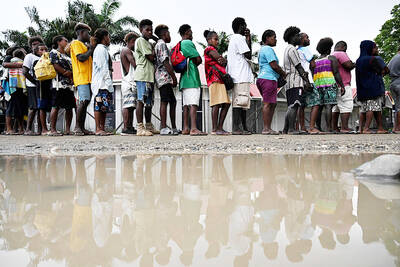“NEWBrew” is no ordinary beer. The new Singaporean blond ale is made with recycled sewage.
The alcoholic beverage is a collaboration between the Singaporean Public Utilities Board (PUB) and local craft beer brewery Brewerkz.
First unveiled at a water conference in 2018, NEWBrew in April went on sale in supermarkets and at Brewerkz outlets.
“I seriously couldn’t tell this was made of toilet water,” said Chew Wei Lian, 58, who had purchased the beer from a supermarket to try after hearing about it. “I don’t mind having it if it was in the fridge. I mean, it tastes just like beer, and I like beer.”
NEWBrew uses NEWater, Singapore’s brand of drinking water recycled from sewage, which in 2003 first flowed from treatment plants to improve the city-state’s water security.
The PUB said that the new beer is part of an effort to educate Singaporeans on the importance of sustainable water use and recycling.
The idea of processing sewage into drinking water, once largely resisted, has been gaining support in the past decade as the world’s supply of fresh water is increasingly under stress.
The WWF estimates that 2.7 billion people find water scarce for at least one month a year.
Advanced economies such as Israel and Singapore that have limited fresh water resources have already incorporated the technology into their supplies.
Los Angeles and London are examining plans to follow suit.
Singapore’s NEWater is made by disinfecting sewage with ultraviolet light and passing it through advanced membranes to remove contaminant particles.
Key to expanding the technology is to persuade the public that once the water has been processed, it is just water.
“NEWater perfectly suits brewing because it tastes neutral,” Brewerkz head brewer Mitch Gribov said. “The mineral profile of water plays a key role in chemical reactions during brewing.”
Breweries elsewhere have also made beer with recycled sewage.
Stockholm-based Nya Carnegie Brewery partnered with brewing giant Carlsberg and the IVL Swedish Environmental Research Institute to launch a pilsner made with purified sewage, while Village Brewery in Canada teamed up with researchers from the University of Calgary and US water technology company Xylem to roll out their own version.
However, not everyone is convinced.
“There are many kinds of beers around,” said Low Yu Chen, a 22-year-old student from Singapore. “If I wanted a beer, I’d pick something made of normal water.”
Others who have sampled NEWBrew say they find that it is a refreshing, light-tasting ale that is perfect for Singapore’s tropical climate.
“If you don’t tell people it’s made from waste water, they probably won’t know,” said Grace Chen, 52, after sampling the ale.

SEEKING CHANGE: A hospital worker said she did not vote in previous elections, but ‘now I can see that maybe my vote can change the system and the country’ Voting closed yesterday across the Solomon Islands in the south Pacific nation’s first general election since the government switched diplomatic allegiance from Taiwan to Beijing and struck a secret security pact that has raised fears of the Chinese navy gaining a foothold in the region. The Solomon Islands’ closer relationship with China and a troubled domestic economy weighed on voters’ minds as they cast their ballots. As many as 420,000 registered voters had their say across 50 national seats. For the first time, the national vote also coincided with elections for eight of the 10 local governments. Esther Maeluma cast her vote in the
Nearly half of China’s major cities are suffering “moderate to severe” levels of subsidence, putting millions of people at risk of flooding, especially as sea levels rise, according to a study of nationwide satellite data released yesterday. The authors of the paper, published by the journal Science, found that 45 percent of China’s urban land was sinking faster than 3mm per year, with 16 percent at more than 10mm per year, driven not only by declining water tables, but also the sheer weight of the built environment. With China’s urban population already in excess of 900 million people, “even a small portion

UNSETTLING IMAGES: The scene took place in front of TV crews covering the Trump trial, with a CNN anchor calling it an ‘emotional and unbelievably disturbing moment’ A man who doused himself in an accelerant and set himself on fire outside the courthouse where former US president Donald Trump is on trial has died, police said yesterday. The New York City Police Department (NYPD) said the man was declared dead by staff at an area hospital. The man was in Collect Pond Park at about 1:30pm on Friday when he took out pamphlets espousing conspiracy theories, tossed them around, then doused himself in an accelerant and set himself on fire, officials and witnesses said. A large number of police officers were nearby when it happened. Some officers and bystanders rushed

HYPOCRISY? The Chinese Ministry of Foreign Affairs yesterday asked whether Biden was talking about China or the US when he used the word ‘xenophobic’ US President Joe Biden on Wednesday called for a hike in steel tariffs on China, accusing Beijing of cheating as he spoke at a campaign event in Pennsylvania. Biden accused China of xenophobia, too, in a speech to union members in Pittsburgh. “They’re not competing, they’re cheating. They’re cheating and we’ve seen the damage here in America,” Biden said. Chinese steel companies “don’t need to worry about making a profit because the Chinese government is subsidizing them so heavily,” he said. Biden said he had called for the US Trade Representative to triple the tariff rates for Chinese steel and aluminum if Beijing was